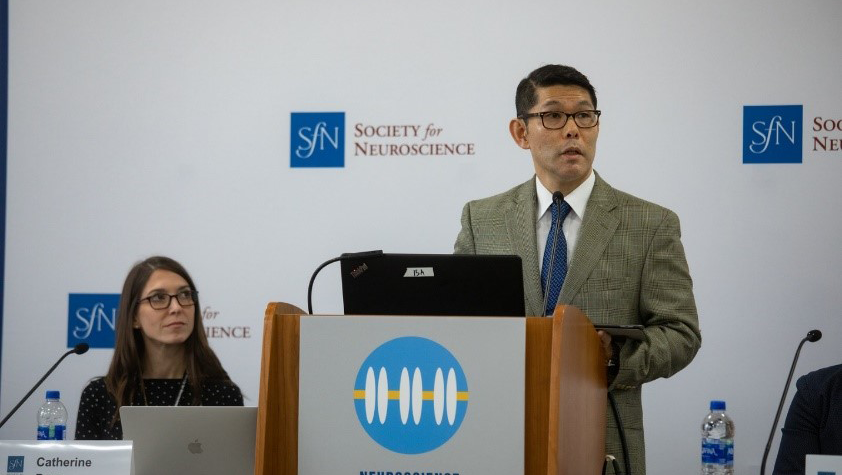SfN Journals: Training the Next Generation of Reviewers
“What is the best way for graduate students to get involved in the peer review process?”
That is one of the most common question the editors of JNeurosci and eNeuro receive not only from graduate students, but also from post-doctoral researchers and junior faculty.
 Wayne Sossin
Wayne Sossin“I don't think I was mentored in peer review. The first time I ever reviewed a paper was as an assistant professor,” said Wayne Sossin, an associate editor for JNeurosci from the Montreal Neurological Institute in the Department of Neurology and Neurosurgery at McGill University. “It is a skill that should be taught.”
Despite being one of the cornerstones of science, peer review can be challenged by a small pool of available reviewers, unconstructive reviews, and bias. JNeurosci’s Reviewer Mentoring Program was designed to address these issues by training the next generation of reviewers.
 Thorsten Kahnt
Thorsten Kahnt“Peer-reviewing is critical for research and science. And it is a substantial part of my daily work. But there is no formalized training and we all more or less learn how to review by doing it,” said Associate Editor Thorsten Kahnt of Northwestern University.
The Reviewer Mentoring Program matches early career researchers with some of the journal’s “most committed and highly respected reviewers,” noted Editor-in-Chief Marina Picciotto in a widely shared editorial announcing the pilot program last year. These one-on-one partnerships make the kind of mentorship Kahnt and many others provide informally to their own students and post-docs available to any interested SfN member.
“I thought that having a more formal way of training the next generation of reviewers would be a great idea, and I wanted to be a part of this,” Dr. Kahnt said. “It will help both the trainees and the authors of the papers they will be reviewing in the future.”
Partnership Approach
Each mentor–trainee pair chooses an unpublished manuscript from the preprint server bioRxiv to review. Once the trainee has produced a review acceptable to the mentor, the trainee is encouraged to post their review as a comment on the bioRxiv paper. While some participants have done so, others have opted to share their feedback with the authors personally at conferences or privately in an email. This prepublication peer review provides authors of the preprint with valuable information they can use to improve their manuscript before submitting it to a journal.
Among the lessons trainees said they learned from the program, many evoked the golden rule: Give the kind of review you would like to receive. That means highlighting the strengths of the research as well as identifying areas for improvement.
 Kurt Fraser
Kurt Fraser“Peer review is your opportunity to engage in a dialogue with the authors about the work they have submitted, and we should be all try to be more kind and understanding of each other,” said Kurt Fraser, a graduate student in the Department of Psychological and Brain Sciences at the John Hopkins University.
Fraser was introduced to scientific publishing as an undergraduate at the University of Michigan. After learning about the Reviewer Mentoring Program from Dr. Picciotto on Twitter, he signed up to work with Associate Editor Gavan McNally. In addition to emphasizing the importance of being kind to authors, Fraser said his mentor showed him how to practically approach the review.
“Dr. McNally introduced a framework for writing succinct and clear reviews that has made the overall process much more streamlined and less of a burden. I now structure reviews by sorting comments into lists of major and minor points which I think is an excellent way to convey feedback.”
Peer Review Fundamentals
 Viola Borchardt
Viola BorchardtClear communication is extremely important when writing a peer review report, the trainees said. Organizing comments into major and minor points helps authors and journal editors understand what a reviewer feels are essential revisions or additional experiments necessary to address the authors’ research question. Viola Borchardt, a postdoctoral researcher in the Oulu Functional Neuroimaging Lab at Finland’s Oulu University Hospital, said differentiating between necessary changes and mere suggestions also helps the reviewer ensure their review remains within the scope of the manuscript.
Peer Review Training Resources
- Reviewer Mentor Program
- Tricks of the Trade Webinars:
- Other Resources on Neuronline:
“It is not the task of the reviewer to generally suggest further work [or] experiments, but rather to judge the provided evidence and give the authors feedback about how their message has been perceived,” said Borchardt. “A review should be clear, precise and polite.”
Reviewers also can help authors navigate the ever-expanding scientific literature. Angélica Torres-Berrío, a postdoctoral fellow in Eric Nestler’s Friedman Brain Institute lab at the Icahn School of Medicine at Mount Sinai in New York, said the exercise challenged her to keep up with current knowledge in the field.
By providing early career neuroscientists with opportunities to learn to constructively review through the mentoring program and interactive webinars, SfN is investing in the future of the field and of peer review. SfN’s journals strive to make the peer review process more transparent, productive, and painless for all involved.
Interested in Joining the Program?
 Angélica Torres-Berrío
Angélica Torres-BerríoAll SfN members who have been first author on at least one peer-reviewed research article are eligible to join the program. For more information, visit the SfN Reviewer Mentoring Program page on the JNeurosci website or contact SfNRMentor@gmail.com.



















